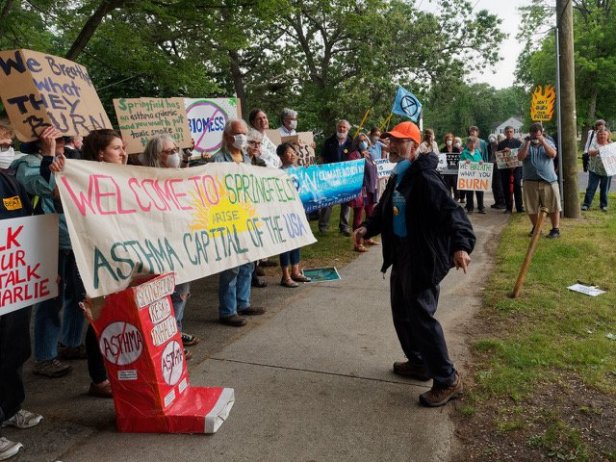Town Council To Consider A Resolution Against Wood-burning Power Plant In Springfield

Climate Action Now sponsored this protest in Springfield against biomass plant development. Photo: Rene Theberge
Amherst’s League of Women Voters Urges Council To Speak Out Against Proposed Biomass Facility
Editor’s Note: This column was written by Martha Hanner on behalf of the Amherst League of Women Voters Sustainability and Climate Action Committee.
The Amherst League of Women Voters is urging the Town Council to approve a resolution protesting the planned wood-burning Springfield power plant and the use of state subsidies for large-scale woody biomass power plants. (See www.lwvamherst.org). The resolution was endorsed unanimously by Amherst’s Energy and Climate Action Committee at their January 27 meeting. The Town Council will consider the resolution on Monday, February 8.
The proposed Palmer Renewable Energy wood-burning power plant has been controversial for a decade. Yet, despite the many legitimate objections, the plant was permitted and is now close to receiving the renewable energy credits that will enable the developer to make this plant profitable.
The Mass. Department of Energy Resources is poised to revise the Renewable Energy Portfolio Standards, so that burning woody biomass would be defined as “non-carbon emitting,” despite the strong scientific evidence to the contrary, and large-scale power plants burning woody residue would have no efficiency requirements in order to receive subsidies.
Wood-fired power plants not only emit more carbon dioxide per kilowatt hour of electric power generated than coal (or any other fossil fuel), but they emit far more respirable particulates. The Pioneer Valley already has serious air pollution. It is well known that air pollution is a major cause of asthma in children; Springfield is called the “asthma capital” of the U.S. Thus, the proposed power plant would have significant negative consequences for the health and well-being of our local residents.
Moreover, the proposed power plant would be sited in a low-income area in East Springfield, exacerbating already serious environmental justice concerns. Numerous scientific studies have shown that mature forests are much more effective in sequestering carbon than a recently replanted forest. It takes 60 to 100 years to replace the carbon dioxide absorption of a forest that has been cut down. We don’t have that time to wait; the next 30 years are the most critical for climate change mitigation. Recent studies of atmospheric carbon dioxide balance show that it is not sufficient for us to reduce carbon dioxide emission; we must also increase carbon dioxide drawdown, in part by leaving forested areas to reach maturity. Thus, in the present climate crisis, large-scale wood burning should not be considered “carbon-neutral”.
LWVA hopes that action by our Town Council will stimulate other local communities to pass similar resolutions.
(For further information regarding wood burning, see a recent Commonwealth Magazine article here.)

1 thought on “Town Council To Consider A Resolution Against Wood-burning Power Plant In Springfield”